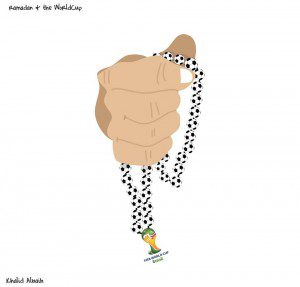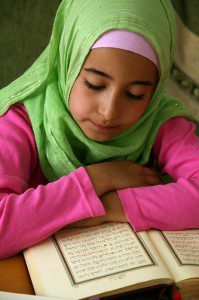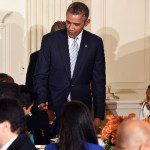This article comes on Day 17 of our special Altmuslim/Patheos Muslim Ramadan #30Days30Writers blog project, in which we are showcasing the voices of 30 Muslim leaders, activists, scholars, writers, youth and more (one on each day of Ramadan) as part of our commitment to own our own narratives and show how we are one Ummah, many voices. To demonstrate how our Ramadan experiences are shared yet unique to each of us.
“Read, O Prophet, in the name of your Lord who has Created! He has created man from a clinging clot. Read! For your Lord is the Most Gracious One, who has taught by the pen, has taught man what he has known not! [Quran 96 : 1-5]”
According to our tradition, before his Prophethood, Muhammad ibn Abdullah would retreat during the month of Ramadan — spending it in contemplation in Cave Hira, just outside of Makkah. One night, a heavenly vision (the angel Gabriel) came to the Prophet and twice ordered him to “read!” — to which he responded that he did not know how to read. The third time, Gabriel ordered the Prophet to read, he continued and taught the Prophet the above verses, which Muslims believe were the very first to be Divinely revealed to the Prophet Muhammad (PBUH)* by the angel Gabriel (AS)** in the sacred month of Ramadan.
These verses impress upon us that the Quran is not only a text to be recited and heard, but also that reading sacred words and using writing as a tool to learn and teach are divinely interrelated. That words have meaning, indeed, the intellect is what differentiates human beings from beasts. And, our free will to believe or reject God is what differentiates us from the angels. Language is one of the most important components of our very essence as human beings.
Believers are asked to conquer their egos, to put their faith in God and to speak the truth. We read myriad examples of this in the Holy Book. We read of Luqman the Wise (AS) teaching his son the virtues of modesty and humility. We read of Lady Mary (AS) being asked to fast from speech when she returned to her family with a baby in tow, and we read of the words the infant Jesus (AS) spoke, exonerating his mother and giving tidings of his own Prophethood.
We read of Zachariah (AS) being ordered to fast from speech for three days as a sign that God will bestow upon him an heir. We read of Joseph (AS) who refused to bear false witness, and spent years languishing in jail for a crime he did not commit. The Prophet Muhammad (PBUH) himself was described by his wife Aisha, may God be pleased with her, as the personal embodiment of the Holy Quran — a literal “walking Quran.”
Millions of Muslims are spending the better parts of their nights reciting God’s Words throughout Ramadan, which is often referred to as the Month of Quran. We remind ourselves of these prophetic stories, of the critical importance of speech, of the sacred responsibility we have to seek the truth with gentleness and humility.
So what does that mean for us today, when anyone with access to the internet has a platform to tell the world his or her thoughts. What is the responsibility we bear as Muslims to offer the world “good” speech? When we do we speak up and speak the truth, and when do we stay silent and keep the peace? How can we use the power of speech to teach or admonish without hurting others or closing their hearts?
Being Careful in Our Words
“Moses said: My Lord! Open for me my heart, and make easy for me my mission, and release the knot from my tongue, so they understand my words.” [Quran 20:25-28]
We must very careful in selecting our words, so that they are not misunderstood, so that they don’t pierce our sisters’ and brothers’ hearts, so they don’t bear witness against us on the Day we meet our Lord. This Ramadan is bearing witness to a segment of the American Muslim community — mobile, sophisticated and wired — committing their all in social media wars. After enduring Abu Easagate and Alice in Arabia this year, I was hoping for a quiet Ramadan, full of contemplation and connection. Alas, that was not to be.
This weekend has raised the issue — not for the first time — of the controversy over Muslims attending the annual White House Iftar. And much has been written about a group of American Muslim thought influencers, academics and chaplains participating in an interfaith program in Israel and Palestine, hosted by a conservative and Zionist Jewish educational institute.
Palestinians and others who support BDS were profoundly angry and disappointed by the program. Those who participated in the program and their supporters responded that Muslims must understand the place that Zionism has in the hearts of most Jews. A social media war erupted in the first days of Ramadan, with Muslims on both sides attacking each others’ integrity and faith. Professor Omid Safi speaks for many when he urges conscientious truth-telling and healing among all parties involved.
All of this is happening in the shadow of two major events: The latest Israeli assault on Gaza and the World Cup, which ended this weekend. In the weeks before the Israeli assault, three Israeli teenagers, Naftali Fraenkel, Gilad Shaer and Eyal Yifrah, were kidnapped and murdered in the middle of the ongoing occupation. This heinous crime led to the kidnapping and brutal murder of Palestinian teenager Muhammad Abu Khdeir, who was burned to death after being forced to drink gasoline. In this chaos, Muhammad’s teenaged American cousin, Tariq Abu Khdeir, who was visiting Jerusalem for a family wedding, was violently assaulted by Israeli police and thrown in detention. He’s now being held under house arrest as the Israeli assault on Gaza continues.
 Israel launched “Operation Protective Edge” while much of the world was engrossed in the final matches of the World Cup, which has led to many Palestinian activists to bemoan the fact that the world’s attention is focused on the spectacle of sport as the death toll reaches at least 185 people — all of them Palestinian — at the time of publication.
Israel launched “Operation Protective Edge” while much of the world was engrossed in the final matches of the World Cup, which has led to many Palestinian activists to bemoan the fact that the world’s attention is focused on the spectacle of sport as the death toll reaches at least 185 people — all of them Palestinian — at the time of publication.
Which of course, has led to many of other Muslims complaining — or pointing out, depending on your perspective — that the crises Muslims are facing in the Central African Republic, Burma, Syria, Iraq, Libya and elsewhere are not receiving as much traction as the Palestinian crisis. Still others contest those domestic crises, such as systemic racism and the violence in America’s cities must have an equal place in our hearts as foreign crises.
When Does it Behoove Us to Be Silent?
The nature of social media wars means that many of the actors feel compelled to drag the rest of us from our prayers, recitations and worship in order to share their two cents. Fasting from speech as our forbears, Zachariah and Mary (AS) did, does not seem to cut it in the online frenzy that seems to say that if you don’t Tweet your support or update Facebook status with a condemnation, then you are forfeiting your right to ever comment on any issue affecting Muslims anywhere forevermore.
The situation highlights for me the critical importance of challenging racism internally and building interracial relationships, institutionally and individually, among American Muslims. Allegiances and support should be inherent in our relationships with each other, but they’re not. Each ethnic/racial group is focusing on the issue that impacts them narrowly without intentionally reaching out to other racial/ethnic groups, nor even praying for each other. This disunity causes dissonance in the “American Muslim narrative,” where the actions of some are directly detrimental to others in the same community.
The recent chain of events highlights for me the fact that Muslims need a multi-pronged approach, one that both conscientiously engages with and speaks truth to power. That’s the only way we can move the dial on any of the issues that are near to our hearts, both here at home and abroad. It also highlights the profound power of loving our sisters and brothers in faith and respecting our differences. Instead of attacking each other, I pray that we can either publicly support each other or remain silent. And in all cases, pray for each other as we stand, reciting the Revealed words, during in our night prayers in this sacred month.
“We have not sent the Quran down upon you to distress you, Oh Prophet – but rather as a revealed Reminder for whomever would revere God, in awe of a Divine word descending from the One who created the earth and the high heavens. The All Merciful who has settled Himself over the Throne, befittingly. To Him belong all that is in the heavens, and all that is in the earth, and all that is between them, and all that is beneath the soil. And whether you utter words out loud or silently, He indeed knows the secret and what is yet more hidden.” [Quran 20:2-7]
*PBUH = God’s Peace Be Upon Him, a prayer Muslims offer after saying the name of our blessed Prophet
**AS = Alayh Salaam, God’s peace on him, a prayer Muslims offer after saying the names of angels, prophets, and divinely inspired teachers
Hind Makki blogs at “Hindtrospectives” on the Patheos Muslim Channel. She is also the curator of Side Entrance, a tumbr dedicated to chronicling women’s spaces in mosques.













